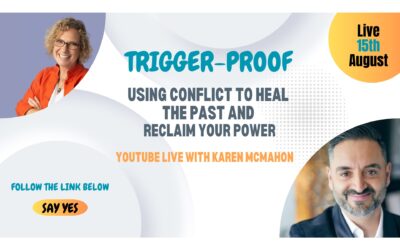"She's just doing it for attention."
"He's so arrogant."
"They think they're better than everyone else."
If you have ever caught yourself
making these snap judgments about others,
consider this:
Those judgments aren't really
about the other person at all.
What if they're actually about the parts of yourself
you've been conditioned to reject?
This insight might be the most transformative relationship principle
I've ever discovered –
and the most uncomfortable to face.
It’s my favorite part of my intuitive Blind Spot Calls.
I love watching people’s faces when I hold up a mirror.
I call it "The Dark Passenger" principle.
Here's how it works:
From early childhood,
we're taught which emotions are "acceptable"
and which are "bad."
For many high-achievers,
emotions like jealousy, envy, anger, or neediness
were labeled as inappropriate,
selfish, or even shameful.
Good kids don't get jealous.
Successful people don't need validation.
Strong individuals don't feel insecure.
So think about it–
what happens to these emotions when we feel them?
Do they simply disappear
because we've decided they're unacceptable?
Not even close.
Instead, they get banished to the shadow –
the unconscious repository of all the parts of ourselves
we've disowned.
Out of sight, but far from gone.
This creates what I call our "Dark Passenger" –
the collection of disowned emotions and traits
that still affect our behavior, but from the shadows.
And here's where it gets fascinating:
The emotions we most strongly reject in ourselves
become the exact things we most harshly judge in others.
Let me share a common example:
Picture a successful, accomplished woman
who prides herself on her intelligence, work ethic, and character.
She's built her identity around these qualities
rather than physical appearance.
What happens when she encounters a younger,
conventionally attractive woman who seems comfortable
with her sexuality and receiving attention for her looks?
Often, an immediate judgment forms:
"She's just using her looks to get ahead."
"She's so shallow."
"She's just trying to get attention."
But what's really happening beneath the surface?
The accomplished woman is experiencing envy or jealousy –
natural human emotions.
But since she's learned these feelings are "bad" or
"inappropriate," she can't acknowledge them, even to herself.
Instead, her mind quickly constructs a story
about the other woman
that helps her avoid facing her own uncomfortable emotions.
This pattern doesn't just apply to appearances.
It shows up everywhere:
-
The leader who criticizes a colleague
for being "too ambitious"
might be disowning their own competitive nature -
The person who judges others for "seeking attention"
might be suppressing their own need for recognition -
The partner who accuses others of dishonesty
might be disconnected from their own capacity for deception
This “shadow projection” creates a double burden:
First, it prevents authentic connection with others
because we're relating to our projections,
not the actual person.
Second, and perhaps more painfully,
it disconnects us from parts of ourselves –
leaving us fragmented and incomplete.
And down right resentful.
For high-achievers, this pattern creates particular suffering.
Many have built their success on a carefully curated self-image
that excludes "unacceptable" traits and emotions.
The energy required to maintain this partial identity is exhausting.
You may excel at work but struggle in intimate relationships.
You can manage teams effectively
but find yourself bewildered by personal conflicts.
You achieve impressive goals but feel a persistent emptiness.
These are often symptoms of a fractured relationship
with your own wholeness.
The cost of this pattern goes beyond just relationship difficulties:
-
Physical health suffers
as the body holds the tension of denied emotions -
Creativity diminishes when substantial energy goes toward maintaining the "acceptable" self
-
Decision-making becomes compromised
when you lack access to your full emotional data -
Leadership effectiveness decreases
when you can't recognize your own shadow in workplace dynamics
Most damaging of all: without access to your complete self,
true intimacy becomes impossible
because you’re walking around resentful most of the time.
As long as certain aspects of your humanity
remain unacceptable to you,
you'll find yourself unconsciously pushing away
or criticizing people who embody those qualities –
often the very ones you're most drawn to.
This explains why so many relationships
follow a predictable arc from initial attraction to inevitable conflict.
We're attracted to people who embody our disowned qualities,
then grow to resent those exact same traits.
Luckily, there’s an alternative to this painful cycle.
It begins with a radical shift
in how we relate to our "Dark Passenger."
Instead of banishing uncomfortable emotions and traits,
we learn how to dance with them.
This doesn't mean acting on every emotion
or indulging every impulse.
It means acknowledging the full spectrum of your humanity –
including the parts you've been taught to reject.
What might this look like in practice?
Imagine the successful woman
from our earlier example encountering that younger,
attractive woman.
Instead of judgment,
she might practice something revolutionary:
Internal honesty: "I'm feeling jealous right now, and that's okay."
Curiosity rather than judgment: "What does this reaction tell me
about my own relationship with beauty and attention?"
Integration instead of projection: "This is about me, not her."
The most courageous might even transform the encounter entirely:
"When you walked by, I noticed how gorgeous you look.
To be honest, I felt a flash of envy because you're radiant.
My mind wanted to make up a story about you
to protect myself from those feelings,
but the truth is, you're beautiful, and that's wonderful."
This level of authentic communication
seems almost unimaginable in our current culture.
But it represents the gateway to a profound form of freedom –
the freedom to be fully human without shame or pretense.
This is what it means to be Trigger-Proof.
This is the embodiment of being a secure human being.
Not the absence of difficult emotions,
but the capacity to acknowledge them
without being controlled by them.
Not the elimination of the shadow,
but the integration of it into a more complete self.
The path to this integration isn't quick or easy. It means:
-
Developing the courage to face parts of yourself
you've been conditioned to reject -
Building the capacity to tolerate uncomfortable emotions
without reacting or getting defensive -
Practicing radical honesty with yourself first,
then gradually with others -
Recognizing your judgments as signposts
pointing to your own disowned qualities
As you engage in this work, something cool happens:
Your relationships transform
because you're finally showing up as your whole self.
Your communication becomes clearer
because it's not filtered through projection.
Your presence becomes more powerful
because you're no longer fragmenting your energy.
Your leadership deepens
because you can recognize shadow dynamics in groups.
Most importantly, you discover that the very qualities
you most feared acknowledging become sources of strength,
creativity, and authentic connection
once they're integrated rather than denied.
This is the journey from fragmentation to wholeness,
from projection to authenticity, from judgment to understanding.
It's not about becoming perfect. It's about becoming complete.
And that is what healing is all about.
Your guide on the side,
and wingman on the adventure.
Nima
(I stand for healed families)
P.S. If this message resonated with you,
and you're curious about how your "Dark Passenger"
might be affecting your relationships and success,
I may be able to help.
I'm offering a limited number of
Shadow Integration Sessions
(valued at $497) for high-achieving individuals
who want to transform their relationship patterns
by reclaiming disowned parts of themselves.
In just one 30-minute call, we can:
-
Identify your specific shadow patterns and how they manifest in your relationships
-
Connect these patterns to your early conditioning
-
Begin the process of dancing with your Dark Passenger
-
Create a roadmap for becoming more integrated and trigger-proof
To be considered, comment or DM with:
-
A pattern of judgment or criticism you notice in yourself toward others
-
How this pattern might connect to your own disowned qualities
-
What you hope to achieve through this work
End your response with: "Nima, can I please get a link to your private calendar?"
This conversation could be the beginning
of a profound shift in how you relate to yourself and others –
moving from projection to authentic connection.




